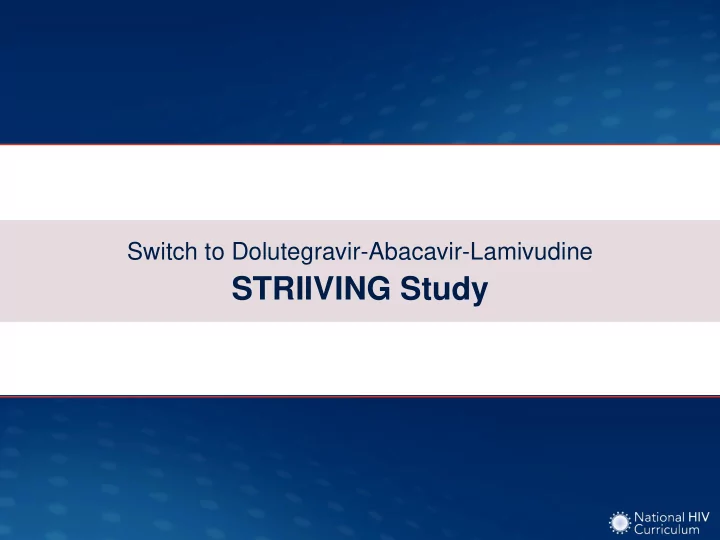

Switch to Dolutegravir-Abacavir-Lamivudine STRIIVING Study
Switch to Dolutegravir-Abacavir-Lamivudine (DTG-ABC-3TC) STRIIVING: Design Week 0 Week 24 Week 48 Study Design: STRIIVING • Background : Open-label, randomized study, phase 3 trial comparing switch to dolutegravir-abacavir-lamivudine (DTG- Early Switch Group ABC-3TC) versus continuation of baseline DTG-ABC-3TC ART (n = 275) • Inclusion Criteria (n = 553) - HIV RNA <50 copies/mL on ART - Stable on current ART for ≥6 months Late Switch Group Late Switch Group - No prior virologic failure Baseline ART DTG-ABC-3TC - HLA B5701 negative (n = 278) (n = 244) • Treatment Arms - Switch to DTG-ABC-3TC - Continuation of Baseline ART x 24 weeks, then switch to DTG-ABC-3TC *Baseline antiretroviral therapy (ART) consisting of 2 NRTIs + Anchor drug (NNRTI, PI, or INSTI) Source: Trottier B, et al. Antivir Ther. 2017;22:295-305.
Switch to Dolutegravir-Abacavir-Lamivudine (DTG-ABC-3TC) STRIIVING: Results Week 24 and 48 Virologic Response Early Switch Group Late Switch Group 100 HIV RNA <50 copies/mL (%) 92 88 80 85 83 60 40 20 234/275 245/278 228/275 224/244 0 Week 24 Week 48 Source: Trottier B, et al. Antivir Ther. 2017;22:295-305.
Switch to Dolutegravir-Abacavir-Lamivudine (DTG-ABC-3TC) STRIIVING: Conclusions Conclusions : “Data demonstrating non -inferiority of switching to ABC/DTG/3TC versus continuing current ART support ABC/DTG/3TC as an option when considering switch regimens in HIV-1-infected adults with stable viral suppression.” Source: Trottier B, et al. Antivir Ther. 2017;22:295-305.
Acknowledgment The National HIV Curriculum is an AIDS Education and Training Center (AETC) Program supported by the Health Resources and Services Administration (HRSA) of the U.S. Department of Health and Human Services (HHS) as part of an award totaling $800,000 with 0% financed with non-governmental sources. This project is led by the University of Washington’s Infectious Diseases Education and Assessment (IDEA) Program. The content in this presentation are those of the author(s) and do not necessarily represent the official views of, nor an endorsement, by HRSA, HHS, or the U.S. Government.
Recommend
More recommend